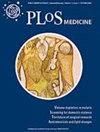外科医生培训等级与单髁膝关节置换术后翻修风险之间的关系:国家关节登记数据分析
IF 9.9
1区 医学
Q1 MEDICINE, GENERAL & INTERNAL
引用次数: 0
摘要
背景 单间室膝关节置换术(UKR)是由处于不同培训阶段的外科医生在不同程度的监督下完成的,但我们不知道这种做法是否安全,其结果是否与由顾问完成的 UKR 相当。本研究的目的是利用英格兰和威尔士的登记数据,调查外科医生级别(顾问或受训者)、受训者的高级监督(是否由主治顾问监督)与UKR术后翻修手术风险之间的关系。方法和结果 我们利用英格兰和威尔士国家关节登记处(NJR)前瞻性收集的数据开展了一项观察性研究。我们纳入了 2003 年至 2019 年期间在 NJR 中记录的因骨关节炎接受初级 UKR 的成年患者(n = 106,206 人)。暴露因素包括手术外科医生的级别(顾问或受训人员)以及受训人员在手术过程中是否由顾问直接监督(简称为 "由一名负责手术的顾问监督")。主要结果是所有原因导致的翻修手术。次要结果是因以下特定适应症进行翻修手术的数量:无菌性松动/溶解、感染、骨关节炎进展、原因不明的疼痛和不稳定性。灵活的参数生存模型根据患者、手术和医疗环境因素进行了调整。我们纳入了 91626 名患者的 106206 例 UKR,其中 4382 例(4.1%)由受训者实施。15年后未经调整的累积失败概率为:顾问 17.13% (95% CI [16.44, 17.85]);受训人员总体 16.42% (95% CI [14.09, 19.08]);受训人员在一名主治医师监督下的失败概率为 15.98% (95% CI [13.36, 19.07]);未受主治医师监督的受训人员失败概率为 17.32% (95% CI [13.24, 22.50])。在粗略模型或调整模型中,外科医生级别与全因改建之间均无关联(调整后 HR = 1.01,95% CI [0.90,1.13];P = 0.88)。受训者的全因生存率与顾问相当,而与顾问的监督水平无关(有监督:调整后 HR = 0.99,95% CI [0.87,1.14];p = 0.94;无监督:调整后 HR = 1.03,95% CI [0.87,1.22];p = 0.74)。本研究的局限性与其观察性设计有关,包括:顾问将病例随机分配给受训者的可能性;残余混杂因素;使用二元变量 "外科医生级别",无法反映受训者之间经验水平的差异。结论 这项对英国牙科手术进行了超过16年随访的全国性研究表明,在英格兰和威尔士目前的培训体系中,受训者的全因植入存活率与顾问相当。这些研究结果支持英格兰和威尔士目前对外科医生进行 UKR 培训的方法。本文章由计算机程序翻译,如有差异,请以英文原文为准。
Association between surgeon training grade and the risk of revision following unicompartmental knee replacement: An analysis of National Joint Registry data
Background Unicompartmental knee replacements (UKRs) are performed by surgeons at various stages in training with varying levels of supervision, but we do not know if this is a safe practice with comparable outcomes to consultant-performed UKR. The aim of this study was to use registry data for England and Wales to investigate the association between surgeon grade (consultant, or trainee), the senior supervision of trainees (supervised by a scrubbed consultant, or not), and the risk of revision surgery following UKR. Methods and findings We conducted an observational study using prospectively collected data from the National Joint Registry for England and Wales (NJR). We included adult patients who underwent primary UKR for osteoarthritis (n = 106,206), recorded in the NJR between 2003 and 2019. Exposures were the grade of the operating surgeon (consultant, or trainee) and whether or not trainees were directly supervised by a consultant during the procedure (referred to as “supervised by a scrubbed consultant”). The primary outcome was all-cause revision surgery. The secondary outcome was the number of procedures revised for the following specific indications: aseptic loosening/lysis, infection, progression of osteoarthritis, unexplained pain, and instability. Flexible parametric survival models were adjusted for patient, operation, and healthcare setting factors. We included 106,206 UKRs in 91,626 patients, of which 4,382 (4.1%) procedures were performed by a trainee. The unadjusted cumulative probability of failure at 15 years was 17.13% (95% CI [16.44, 17.85]) for consultants, 16.42% (95% CI [14.09, 19.08]) for trainees overall, 15.98% (95% CI [13.36, 19.07]) for trainees supervised by a scrubbed consultant, and 17.32% (95% CI [13.24, 22.50]) for trainees not supervised by a scrubbed consultant. There was no association between surgeon grade and all-cause revision in either crude or adjusted models (adjusted HR = 1.01, 95% CI [0.90, 1.13]; p = 0.88). Trainees achieved comparable all-cause survival to consultants, regardless of the level of scrubbed consultant supervision (supervised: adjusted HR = 0.99, 95% CI [0.87, 1.14]; p = 0.94; unsupervised: adjusted HR = 1.03, 95% CI [0.87, 1.22]; p = 0.74). Limitations of this study relate to its observational design and include: the potential for nonrandom allocation of cases by consultants to trainees; residual confounding; and the use of the binary variable “surgeon grade,” which does not capture variations in the level of experience between trainees. Conclusions This nationwide study of UKRs with over 16 years’ follow up demonstrates that trainees within the current training system in England and Wales achieve comparable all-cause implant survival to consultants. These findings support the current methods by which surgeons in England and Wales are trained to perform UKR.
求助全文
通过发布文献求助,成功后即可免费获取论文全文。
去求助
来源期刊

PLoS Medicine
医学-医学:内科
CiteScore
21.60
自引率
0.60%
发文量
227
审稿时长
3 months
期刊介绍:
PLOS Medicine aims to be a leading platform for research and analysis on the global health challenges faced by humanity. The journal covers a wide range of topics, including biomedicine, the environment, society, and politics, that affect the well-being of individuals worldwide. It particularly highlights studies that contribute to clinical practice, health policy, or our understanding of disease mechanisms, with the ultimate goal of improving health outcomes in diverse settings.
Unwavering in its commitment to ethical standards, PLOS Medicine ensures integrity in medical publishing. This includes actively managing and transparently disclosing any conflicts of interest during the reporting, peer review, and publication processes. The journal promotes transparency by providing visibility into the review and publication procedures. It also encourages data sharing and the reuse of published work. Author rights are upheld, allowing them to retain copyright. Furthermore, PLOS Medicine strongly supports Open Access publishing, making research articles freely available to all without restrictions, facilitating widespread dissemination of knowledge. The journal does not endorse drug or medical device advertising and refrains from exclusive sales of reprints to avoid conflicts of interest.
 求助内容:
求助内容: 应助结果提醒方式:
应助结果提醒方式:


